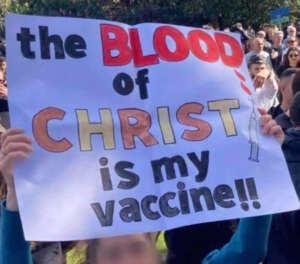Eternity is running a pair of opinion pieces that view the recent anti-lockdown demonstrations through two very different lenses. By running both we don’t mean to imply that the authors oppose each other, just that they came from different angles.
I am tired of people misusing Christianity for all kinds of political and moral messaging. Whether it’s intellectual know-it-alls who explain away all the bits of the Bible that don’t fit with contemporary moral proclivities or those who get sucked in by crazy conspiracies and then justify them from loopy readings of the Bible. Indeed, some of this isn’t’ just odd, it is downright dangerous and blasphemous.
Take, for example, this sign that was waving about during an anti lockdown protest yesterday,
“The blood of Christ is my vaccine.”

I do hope people realise that Christians don’t support or agree with this banner that was displayed at an anti-lockdown protest yesterday in Australia. I suppose a few Christians might like the banner, but that doesn’t make it true or helpful.
This is a difficult year
I will address this appalling sign shortly, but first of all, I want to say that I understand how many people are frustrated and fed up and hurting during the COVID-19 pandemic. I doubt if there are many Australians who don’t feel at the very least one of those emotions right now. I have seen many struggling Aussies over the last 19 months and I know it’s hard. No one wants to be in the situation that we’re currently experiencing.
My concern here is the so-called Christian messaging present in these protests.
I’m not arguing here for or against lockdowns. Neither am I advocating for or against other measures taken during the pandemic. It’s not that I don’t have opinions about such things but that I’m aware of the fact that I’m not a medical professional and these are complex matters and I don’t have to shoulder responsibility for millions of people. It may well be the case that we won’t know what the right course of action was for several years to come. Uncertainties and confusion have often been compounded by the unnecessary politicisation of the pandemic and the at times enflaming journalism by some members of the media (as opposed to the great reporting that’s been done by many other journalists).
When it comes to protests my view is that it’s unwise to protest right now (that was my position last year as well), yes even selfish. At the same time, we can be concerned by any Government that stifles peoples’ right to protest, even when we disagree with their point of view. Two things can be right at the same time. The higher biblical ethic however isn’t to push for my rights, it is to love the other.
The Bible doesn’t support conspiracies
I digress, my concern here is the so-called Christian messaging present in these protests. If you are someone who claims to follow Jesus Christ, before making any decision first ask, am I faithfully promoting the good news of Jesus Christ? Another question I should ask is, am I loving my neighbour by joining in this unlawful and untimely rally? While I am sure there were a few well-meaning Christians protesting yesterday, that is no excuse for screwing up the beautiful Christian message by twisting it with anti-VAX nonsense.
There is a difference between someone who declines vaccination as a result of carefully thought out reasoning and one who is saying no because they believe speculative hearsay and conspiracy theories. For me, I’m convinced taking the vaccine is sensible and it’s is foremost about loving others and putting their health above my own (I’ve had my first round of Pfizer).
The Bible itself is not anti-medicine anymore than the Bible isn’t anti-science. The Apostle Paul once says to a young Timothy, I hear that you’re unwell, take medicine. On many occasions when the Bible records people who are hungry, the answer was to provide food so that they may eat. When people were tired they slept. We are physical beings for God has made a physical world, not just a psychological and spiritual world. He has made a world such that we can understand its mechanics and make advancements in technology and science and medicine.
The Bible talks about people who advocate and believe wonky ideas and calls on churches to guard against them For example, n the First Pastoral Epistle the Apostle Paul famously calls out conspiracy theories and demonstrated why they have no place in the Christian community. He wrote,
As I urged you when I went into Macedonia, stay there in Ephesus so that you may command certain people not to teach false doctrines any longer or to devote themselves to myths and endless genealogies. Such things promote controversial speculations rather than advancing God’s work—which is by faith. The goal of this command is love, which comes from a pure heart and a good conscience and a sincere faith. Some have departed from these and have turned to meaningless talk. They want to be teachers of the law, but they do not know what they are talking about or what they so confidently affirm. (1 Timothy 1:3-7)
Scholars can’t be certain about the precise content of these myths and genealogies. However, later in 1 Timothy (ch.4), Paul talks about people who were advocating distorted views of marriage, food, and other everyday norms. The Apostle is adamant,
“Such teachings come through hypocritical liars, whose consciences have been seared as with a hot iron”
Indeed, Paul argues that such abuse of Christian doctrine is harmful to people physical and spiritual wellbeing” (1 Timothy 4).
The meaning of the blood of Jesus
When people mix the Christian message with speculative theories we find absurd statements such as the banner which many journos are enjoying sharing around on social media, “The blood of Christ is my vaccine”.
What an awful slogan. This kind of misrepresentation is as detrimental to the Christian message as was the false teachers whom Paul spoke against.
Just in case someone is wondering, the blood of Jesus does not have physical properties that will so how could it mingle with our cardiovascular system to fight and destroy viral infection. Such medieval thinking is superstition, not Christian.
However, I will never ridicule the idea of the ‘blood of Christ’. This idea of Christ’s blood is a crucial and central aspect of Christian belief. Without this blood, there is no Christianity.
I get it, the very thought of blood isn’t attractive to our modern sensibilities. The theological significance of blood may not be as familiar to us as it is in other cultures. Blood is graphic. If we find the notion of spilled blood uncomfortable and even gross, we have come some way to understand the significance of blood in Biblical teaching and practice. The shedding of blood goes a long way to demonstrate the true horror of human sinfulness and the extraordinary length God went to bring atonement and deliver reconciliation.
Blood is used in many different ways in the Bible, but most of the time it signifies death. Blood is often used in a technical sense to refer to sacrificial death. In the first place, blood speaks of sacrifices conducted in the Old Testament, and these are preparing for and pointing to the truly efficacious sacrifice that atones for human sin; the death of Jesus Christ.
”For you know that it was not with perishable things such as silver or gold that you were redeemed from the empty way of life handed down to you from your ancestors, but with the precious blood of Christ, a lamb without blemish or defect. He was chosen before the creation of the world but was revealed in these last times for your sake. (1 Peter 1:18-20)
“Remember that at that time you were separate from Christ, excluded from citizenship in Israel and foreigners to the covenants of the promise, without hope and without God in the world. But now in Christ Jesus, you who once were far away have been brought near by the blood of Christ. For he himself is our peace, who has made the two groups one and has destroyed the barrier, the dividing wall of hostility,” (Ephesians 2:18-20)
Let me explain it this way, while the biblical language of blood may be unusual for many of us, we do understand the concept of sacrifice. The notion of someone laying down their life in order to save another is a common theme in literature and film. In real life, such events are often mentioned on the news for they are rare and wonderful examples of love.
Melbourne’s Shrine of Remembrance has these words engraved in the interior of the building, “Greater love hath no man”.
While these words aptly describe the sacrifice of our war dead, these are in fact words spoken by Jesus. These words speak of the greatest sacrifice we can make for the sake of another, and the point to the ultimate sacrifice; the cross.
“But God demonstrates his own love for us in this: While we were still sinners, Christ died for us.” (Romans 5:8)
When a protester distorts the Christian message and attaches it to something like the anti-vac movement, people will understandably mock her. Sadly, they may also go away with the wrong view of Christ and of Christianity. I’m thankful that most Christians have more sense, and hopefully better theology. For the rest of Australia, please don’t judge the truly sublime message of Jesus Christ by a few dreadful banners. Instead, find a Christian church, open a Bible, and discover the good news of Jesus for yourself.
First published at Murraycampbell.net A version has also been on au.gospelecoalition.org
Pray
Some prayer points to help
Pray for those struggling with lockdown and employment restrictions.
Pray for those ministering to them, pastors, nurses and others.
Pray for those with COVID 19 disease.


